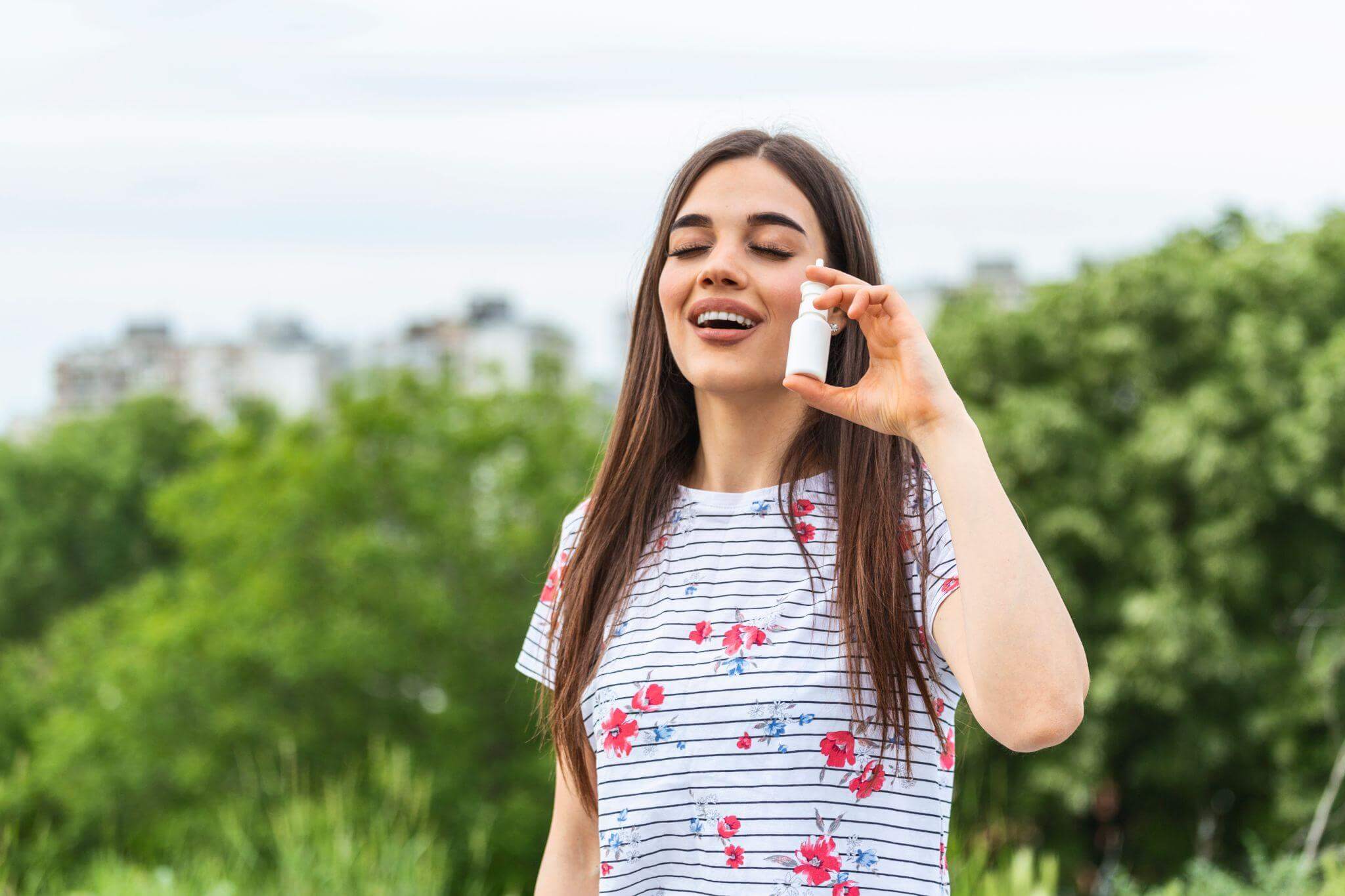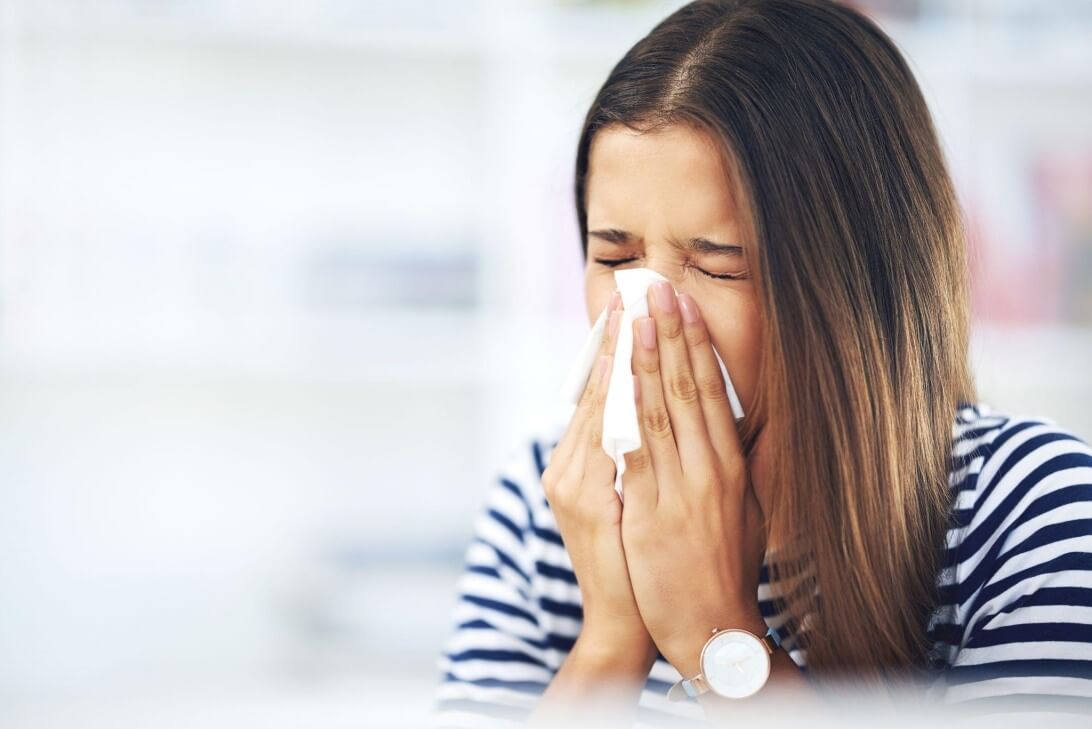Highlights
- COVID produces many symptoms similar to influenza and allergic reactions.
- Fever is the best indication that you are dealing with COVID, not an allergy.
- COVID symptoms vary from one variant to another, making it difficult to settle the COVID vs. allergies question.
- If you suspect you may have COVID, seek medical help and follow your healthcare provider’s recommendations.
- You can treat your allergies with widely available allergy medications.
COVID-19 has coexisted for over two years now with seasonal allergies, the flu, and other allergic reactions. Many of its symptoms coincide with those of allergies. However, there are also subtle and not-so-subtle differences between them.
COVID vs. Allergies: The Most Telltale Difference
Sometimes, due to the similarities in symptoms, you can’t tell COVID apart from allergies. Your top clue, however, is fever.
COVID Fever Is Common
A COVID infection often involves fever, though not always. According to an early COVID study, over 79% of COVID-19 patients develop a fever. In some cases, this fever can last for around ten days, subsiding when the body overcomes the viral infection.
COVID fever tends to be a medium- or low-grade fever. 44% of adult patients develop a medium-grade fever, and 38% a low-grade fever. Only 14.7% have a high-grade fever.
If you have persistent low- or medium-grade fever, you probably have COVID (or influenza or other illness), not an allergic reaction.
In children, fever is a less relevant clue. Most pediatric COVID patients (54.1%) do not develop fever as a symptom of the infection. Still, if your child comes down with persistent fever, it is more likely that you are dealing with COVID, the flu, or another ailment than an allergy.
In a little over 14% of adult COVID patients, chills accompany fever. Like a fever, chills may mean that you may have COVID instead of an allergic reaction.
Allergies Don’t Cause Fever
Although we may call allergic rhinitis hay fever, the condition, like other allergic reactions, does not cause fever.
Inflammation in allergies is different from the effects of viral infections. Allergies cannot cause fever, but they can cause health complications that can lead to fever.
For example, a stuffy nose resulting from hay fever may degenerate into a sinus infection, and sinus infections can cause fever.
Other Significant Differences Between COVID and Allergy Symptoms
After a fever, your best bet to tell COVID apart from an allergy is the sudden and complete loss of smell.
Loss of smell is one of the prominent early symptoms of a COVID infection. It was one of the first telltale symptoms people spotted early in the pandemic.
Some loss of smell can occur with allergic reactions, but it is usually a consequence of a stuffy nose and only partial.

A COVID infection can cause you to lose your sense of smell without a stuffy nose
With a COVID infection, a stuffy nose doesn’t accompany loss of smell. Patients have reported being able to breathe normally through the nose.
According to researchers, the loss of the sense of smell as a COVID symptom affects more women than men. Loss of taste may accompany it. Older people are less likely to experience this COVID symptom.
In later COVID variants, the loss of smell affected a smaller percentage of patients. In early COVID infections, 65-70% of patients experienced a loss of smell. In Omicron infections, this percentage dropped to 12-23%.
COVID vs. Allergy Symptoms: Subtle Differences
Allergies affect the organism in different ways than viral infections. The two conditions trigger many symptoms with subtle differences.
- Itchy and watery eyes, itchy inner ears, nose, and mouth. Allergies irritate the areas allergens affect. It is common for allergic reactions to irritate the eyes, inner ears, nose, and mouth. COVID does not irritate these organs and does not cause itchiness. It may cause conjunctivitis (pink eye), like some allergies.
- Diarrhea. COVID is a far-reaching systemic disease affecting the body in more ways than we know. It can sometimes interfere with digestion, causing diarrhea. Allergic reactions do not cause diarrhea. Only anaphylactic shock, the most severe allergic reaction, can cause diarrhea.
- Nausea and vomiting. COVID can cause extreme nausea and vomiting. Some COVID survivors struggle with these symptoms for a long time after they recover from the infection. Except for anaphylaxis, allergic reactions seldom cause nausea and vomiting.
- Sneezing. Although it may occur as a COVID symptom, sneezing is not a hallmark of the infection. Allergic reactions often involve sneezing, especially when the allergen-affected area is the nose, eyes, or mouth.
- Sore throat. Some COVID variants can cause sore throat. This symptom is not particularly frequent in COVID infections. And it happens rarely as a result of an allergic reaction.
- Headache. Headache is the hallmark of many viral infections, including the flu and common cold. COVID is no exception. It frequently causes headaches as well. Allergic reactions seldom cause headaches.
- Muscle aches. Fever tends to cause muscle aches and weakness. COVID often causes these symptoms, but allergic reactions do not.
COVID vs. Allergy Symptoms: Similarities
Some of the COVID and allergy symptoms that are similar are:
- Cough. COVID cough is dry and persistent. Allergic reactions may cause coughing as well. Those that affect the respiratory system may also cause tightness around the chest as a result of persistent coughing.
- Stuffy or runny nose. Early COVID variants did not cause a stuffy or runny nose, but the Omicron version attacks the upper airways, causing stuffiness similar to the symptoms of some allergic reactions.
- Fatigue. COVID is an aggressive disease that takes a high toll on the body. It taxes the immune system and drains you of energy. Allergic reactions can have similar effects, especially if you leave them untreated.
Different COVID Variants Cause Different Symptoms
Early COVID variants did not cause a runny and stuffy nose and didn’t resemble the common cold or influenza as much as later variants. As the virus mutates, new variants may produce new symptoms that can make it even more difficult to distinguish between COVID and allergy attacks.
Consider the context when you don’t know whether you have an allergy or COVID. If you just finished mowing the lawn or exposed yourself to other allergens, you are more likely to have an allergic reaction than COVID. If you are unsure what you have, seek medical attention.
If you have an allergy, allergy medications can help you manage your condition and improve your quality of life. Some allergy medications can be expensive. And if you have to use them regularly, they can upend your finances.
Find the Lowest Price for Allergy Medications

BidRx specializes in helping customers find the lowest prices for allergy medications. BidRx.com lets users create bids and have pharmacies compete to deliver your medications for the best price.
To get your allergy medications at the lowest price:
- Create an account and locate your medication on our medication page.
- Create a bid.
- Wait for your offers, then choose the best one.
- Have your medications shipped to you or pick them up locally, depending on the offer you choose.
Ordering your medications through BidRx is fast and easy. Create your bid today!
